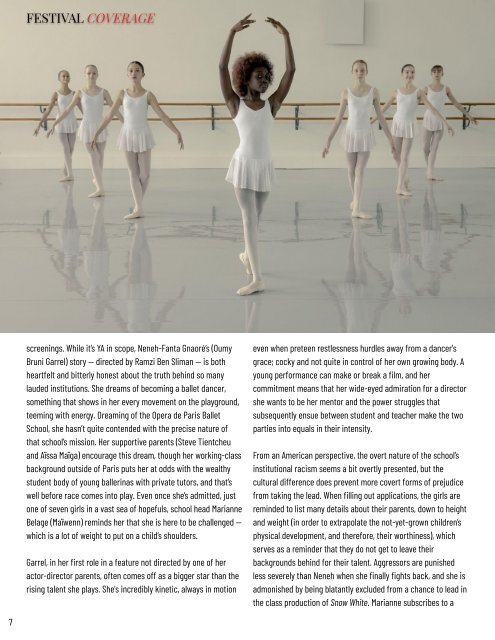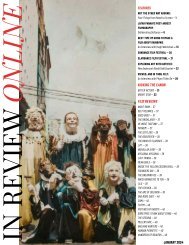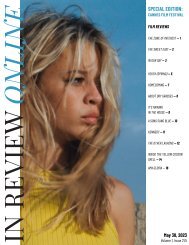InRO Weekly — Volume 1, Issue 10
You also want an ePaper? Increase the reach of your titles
YUMPU automatically turns print PDFs into web optimized ePapers that Google loves.
FESTIVAL COVERAGE<br />
screenings. While it’s YA in scope, Neneh-Fanta Gnaoré’s (Oumy<br />
Bruni Garrel) story <strong>—</strong> directed by Ramzi Ben Sliman <strong>—</strong> is both<br />
heartfelt and bitterly honest about the truth behind so many<br />
lauded institutions. She dreams of becoming a ballet dancer,<br />
something that shows in her every movement on the playground,<br />
teeming with energy. Dreaming of the Opera de Paris Ballet<br />
School, she hasn’t quite contended with the precise nature of<br />
that school’s mission. Her supportive parents (Steve Tientcheu<br />
and Aïssa Maïga) encourage this dream, though her working-class<br />
background outside of Paris puts her at odds with the wealthy<br />
student body of young ballerinas with private tutors, and that’s<br />
well before race comes into play. Even once she’s admitted, just<br />
one of seven girls in a vast sea of hopefuls, school head Marianne<br />
Belage (Maïwenn) reminds her that she is here to be challenged <strong>—</strong><br />
which is a lot of weight to put on a child’s shoulders.<br />
Garrel, in her first role in a feature not directed by one of her<br />
actor-director parents, often comes off as a bigger star than the<br />
rising talent she plays. She's incredibly kinetic, always in motion<br />
even when preteen restlessness hurdles away from a dancer's<br />
grace; cocky and not quite in control of her own growing body. A<br />
young performance can make or break a film, and her<br />
commitment means that her wide-eyed admiration for a director<br />
she wants to be her mentor and the power struggles that<br />
subsequently ensue between student and teacher make the two<br />
parties into equals in their intensity.<br />
From an American perspective, the overt nature of the school’s<br />
institutional racism seems a bit overtly presented, but the<br />
cultural difference does prevent more covert forms of prejudice<br />
from taking the lead. When filling out applications, the girls are<br />
reminded to list many details about their parents, down to height<br />
and weight (in order to extrapolate the not-yet-grown children’s<br />
physical development, and therefore, their worthiness), which<br />
serves as a reminder that they do not get to leave their<br />
backgrounds behind for their talent. Aggressors are punished<br />
less severely than Neneh when she finally fights back, and she is<br />
admonished by being blatantly excluded from a chance to lead in<br />
the class production of Snow White. Marianne subscribes to a<br />
7
















